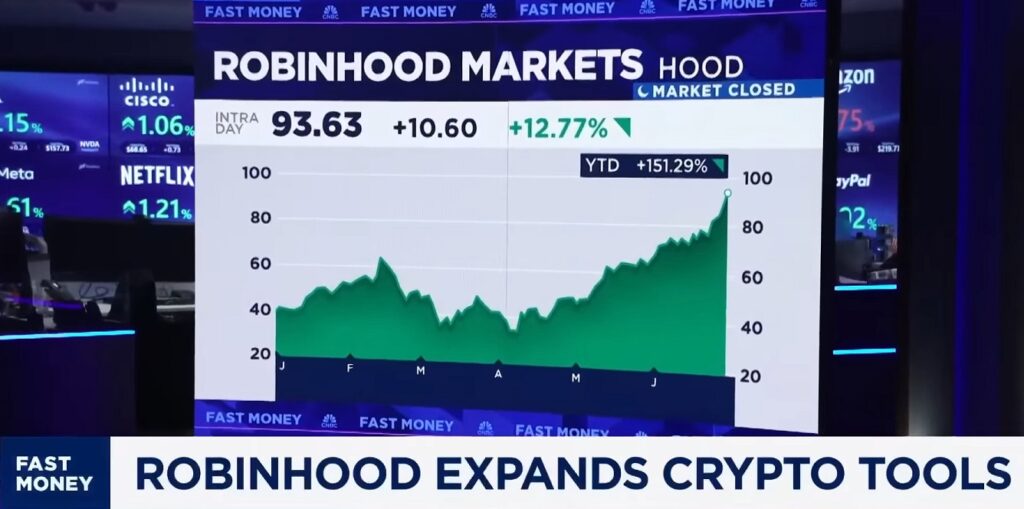
The stock of Robinhood has surged over 160% in 2025 as it reached an all-time high on Friday. The online brokerage platform that allows individuals to trade stocks and cryptocurrencies had its price temporarily surge past $101 before dipping minimally by the close of the day.
This aggressive growth is accompanied by rising Bitcoin and other crypto stocks. However, a recent Bloomberg report jolted the market, reporting that JPMorgan intends to begin charging fintech firms for access to consumer banking data. That would raise expenses on platforms such as Robinhood, PayPal, and Affirm, which closed the day almost 6% lower.
Despite its massive stock gains, Robinhood is confronting a number of serious issues. The Florida Attorney General, James Uthmeier, initiated an investigation into Robinhood Crypto, stating the platform potentially misled customers by stating it provides the lowest-cost crypto trading.

Uthmeier indicated Robinhood‘s position taking payment for order flow—where third-party firms pay to execute trades—could lead to more unfavorable pricing for consumers. But Robinhood’s attorneys pushed back, indicating they provide complete fee disclosures and provide the lowest average fees.
The company is also under fire for a new 25% fee on crypto staking rewards for U.S. users starting October 1. Staking lets people earn passive income by locking up their crypto, but platforms usually take a cut. Robinhood’s new rate is similar to Coinbase’s 25.25%–35% fee, but higher than Gemini’s 15% flat fee. In Europe, Robinhood plans to take only 15%.
This is a significant change for Robinhood, which steered clear of staking in the past due to U.S. regulations. Under President Biden, the SEC moved against staking, labeling it as an unregistered security. Since President Trump returned to power, however, the SEC has retreated, even disposing of cases against corporations like Coinbase and Binance.
While that is happening, Robinhood is going international with stock tokens based on blockchain. They provide an entry for Europeans to gain exposure to private firms such as OpenAI and SpaceX. The tokens are supplied through special purpose vehicles (SPVs)–firms that acquire actual shares and then issue tokens linked to them. However, buyers of the tokens do not receive actual ownership or voting rights.
OpenAI is not pleased with this and stated Robinhood issued the tokens without approval. Robinhood CEO Vlad Tenev acknowledged the tokens aren’t “technically equity,” but explained they nevertheless provide normal investors an opportunity to invest in rapidly growing companies prior to them becoming public.
Europe’s top regulator for Robinhood, the Bank of Lithuania, indicated it’s considering the tokens and holding off for more information. The bank wishes to ensure that investors are clearly and objectively communicated with. Tenev reacted by saying Robinhood is willing to work with them and indicating that they crafted the tokens to satisfy regulatory requirements.
SEC Commissioner Paul Atkins recently referred to the token model as an “innovation”, which may assist Robinhood as it expands its tokenized equity business, despite legal regulations still being uncertain.
All the regulatory and legal challenges aside, investors are optimistic. Robinhood is even eyeing a payoff from President Trump’s new megabill that would see $1,000 government-seeded investment accounts for infants. Robinhood reports that it’s already developing an app for the new “Trump Accounts” program.
With political backing and strong momentum, Robinhood is remaining laser-like focused on innovation despite being grilled by tough questions from regulators.